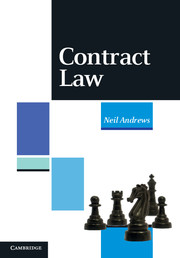Book contents
- Frontmatter
- Contents
- Preface
- Table of cases
- Table of statutes
- Table of statutory instruments
- Part I Introduction
- Part II Formation
- Part III Consideration and intent to create legal relations
- Part IV Third parties and assignment
- Part V Vitiating elements
- Part VI Terms and interpretation
- Part VII Breakdown and liability
- Part VIII Remedies for breach
- Part IX Illegality and public policy
- Part X The future
- Appendix: A who's who of contract law
- Bibliography
- Index
Appendix: A who's who of contract law
- Frontmatter
- Contents
- Preface
- Table of cases
- Table of statutes
- Table of statutory instruments
- Part I Introduction
- Part II Formation
- Part III Consideration and intent to create legal relations
- Part IV Third parties and assignment
- Part V Vitiating elements
- Part VI Terms and interpretation
- Part VII Breakdown and liability
- Part VIII Remedies for breach
- Part IX Illegality and public policy
- Part X The future
- Appendix: A who's who of contract law
- Bibliography
- Index
Summary
This list does not include jurists who have not yet retired from their judicial or academic posts.
Lord Ackner
Desmond Ackner, 1920–2006. His father was a Jewish dentist from Vienna who settled in London. Desmond Ackner attended Highgate School and Clare College, Cambridge (where he later became an Honorary Fellow). Bencher of the Middle Temple. He began with Economics at Clare, but changed to Law. Called to the Bar in 1945, becoming a QC in 1961, he became a celebrated and successful advocate in the 1960s in several fields (described by Sir Michael Kerr, As Far as I Remember (2002), 320–1, as an ‘all-rounder’) (Lord Ackner, even in his eighties, was still an impressive after-dinner speaker). Appointed a High Court judge, 1971; sat in the Commercial Court from 1973; Court of Appeal, 1980; House of Lords, 1986. His judgment on reliance loss in C & P Haulage v. Middleton (1983, CA) (18.26) is important (coincidentally, Sir Michael Hutchison, also an alumnus of Clare College, refined this doctrine in CCC Films v. Impact Quadrant Ltd (1985): burden of proof in this context: 18.26). But Lord Ackner's most important contribution is Walford v. Miles (1992), where he gave the leading speech (‘lock out’ agreements valid, if fixed in time; and invalidity of an agreement to bargain in good faith: 2.07 to 2.10). His daughter, Claudia Ackner, is (as was her father) a judge and a Bencher of the Middle Temple.
- Type
- Chapter
- Information
- Contract Law , pp. 673 - 696Publisher: Cambridge University PressPrint publication year: 2011



